These are some of the things that come up in Hong Kong movies or in discussion about them.
![]()
These are some of the things that come up in Hong Kong movies or in discussion about them.
Related Links:
Thanks to Hong Kong Obscura, Hong Kong Cinema-View From the Brooklyn Bridge, The Hong Kong Tourist Association Homepage, Foon Yen, "The Diablocal Erroneous Monk," "silverfox", Peter Nepstad, YTSL and "Ol' Battlemonkey" from alt.asian-movies/Mobius and the books "Hong Kong Action Cinema", "Planet Hong Kong" and "City on Fire" for providing some of the info for this section.
Page 1 / Page 2 / Page 3 / Page 4 / Page 5 / Page 6 / Main Page
4 - Regarded as an unlucky number in Hong Kong.
8 - Regarded as a lucky number in Hong Kong (the Cantonese translates to "wealth").
18 Bronzemen - A group of highly-trained fighters that guarded the Shaolin monks and also formed the final part of their training. Made famous by the movies of the same name.

1997 - The year Hong Kong and related territories (a British colony) was handed back over to Chinese control after the British "won" the port after years of fighting, staring in the 1840's with the Opium War (see below). For more information about the handover, check out the Nando Times news archive.
2047 - The year the Chinese government will formally take control of Hong Kong.
ABC - Acronym for American Born Chinese, a person who was born in America but moves over to Asia.
ABT - Acronym for the John Woo movie A Better Tomorrow, which kicked off the gangster movie craze in Hong Kong upon its release in 1986.
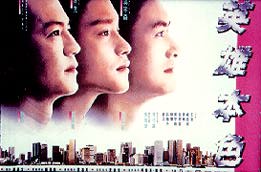
ACC - Acronym for the magazine Asian Cult Cinema, One of the few (at least here in the US) English-language magazines that covers Hong Kong movies. It's an okay mag, but I don't think it's really worth the $6 price tag. There's also way too much coverage of Japanese sex films; at times it comes off looking like a glorified porno mag. Created and edited by Tom Weisser (pictured below right).


action director - Also known as an action co-ordinator, stunt director or 2nd unit director; the person in charge of the action sequences in films. Depending on the director, the action director may actually take control over the set during the filming of the sequence. Good action directors (such as Sammo Hung) often become very powerful in Hong Kong film-making, moving on to producing and/or directing.
ah - A Cantonese word used to designate a friend; a "casualizing" of a proper personal name. For instance, Chow Yun-Fat might be called "Ah Yun" by his friends and relatives.
ah can - A Cantonese nickname (loosely translated to "country bumpkin") for Mainlanders who have moved to Hong Kong. Used to describe certain moives such as Ninth Happiness, where the main conflicts come from the clash between city (Hong Kong) and country (China) values.
alt.asian-movies - A Usenet newsgroup (message board) for the discussion of (you guessed it) Asian movies.
Arena Video - A video company known for putting fake titles (usually with "gangsta" slang) on and hastily (and badly) editing movies so they can sell them as different films. For example, after Jet Li became popular in the US after his appearance in Lethal Weapon 4, they renamed Li's Kung Fu Cult Master to Lord of the Wu Tang. Also has a subsidiary called Xenon.
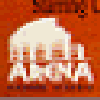
artifacting - Sometimes referred to as pixellation, this problem is found on many VCDs and cheap DVDs as poor compression methods (ways to get the movie onto the disc) result in the colors in the frame becoming "blocky," such as in the top right corner of the frame below.
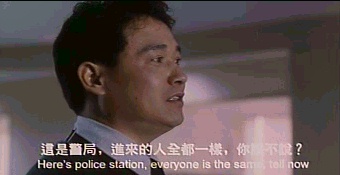
astronaut - Someone whose family has moved abroad (usually to Canada or Australia) to obtain passports/citizenship, but themselves stays in (or commutes to) Hong Kong, usually for monetary reasons.
auditorium version - A bootleg version of a movie that was shot with a camcorder in the theatre, usually during a premiere screening.
ATV - Acronym for Asian Television, a popular TV network known for their dramas. Once went under the name RTV (aka Rediffusion Television).
banana - An Asian person that tries to "act white" by adopting Western mannerisms or dress (yellow on the outside, white on the inside) -- Aunt Yee (Rosamund Kwan) in the Once Upon a Time in China series is often the recipient of this insult; also a slang term for penis.
big and small - A popular dice (gambling) game also called tai sai ("big or small") and sic bo ("treasure of the dice"). The game plays similarly to roulette as the players must bet on the numbers or combonations that will come up. For more information on the rules, click here.
Big Brother - The leader of a gang/crime "family."
bluescreen - A type of special effect that allows actors/objects to be placed on top of previously filmed images. Often used in Western (and to a smaller extent in Hong Kong) movies for dangerous stunts. Newer movies use a slightly different process known as greenscreen.
Boxer Rebellion - Also known as the Boxer Uprising, this was a Chinese nationalist uprising against foreigners, the representatives of alien powers, and Chinese Christians in 1900. Expulsion of all foreigners from China was the ultimate objective of the uprising.
In 1899, a secret society of Chinese called the Yihequan ("Righteous and Harmonious Fists"), known by Westerners as the Boxers, began a campaign of terror against Christian missionaries in the northeastern provinces. Although the Boxers were officially denounced, they were secretly supported by many of the royal court, including the Dowager Empress Cixi (Tz'u-hsi). Economic and political exploitation of China by various Western powers and Japan and humiliating military defeats inflicted by Great Britain in the Opium Wars (1839-1842, 1856-1860) and by Japan in the First Sino-Japanese War (1894-1895) were the main causes of Chinese resentment, compounded by general economic problems. The terrorist activities of the Boxer society gradually increased during 1899 with Boxer bands attacking Christians on sight. When these bands entered the Chinese capital, Beijing, the foreign powers dispatched a small relief column from Tianjin (Tientsin) to secure their interests and citizens in the capital. On June 13 Cixi ordered imperial troops to turn back this column, and the ensuing crisis culminated on June 18, 1900, in a general uprising in Beijing, with Cixi ordering that all foreigners be killed. Many foreigners and others took refuge in the part of the city where the foreign legations were located; the area was placed under siege by the rebels. A larger relief expedition consisting of British, French, Japanese, Russian, German, and American troops relieved the besieged quarter and occupied Beijing on August 14, 1900. The relief forces retained possession of the city, looking for and punishing anti foreign actions, until a peace treaty was signed on September 7, 1901.
By the terms of the treaty the Chinese were required to pay, over a period of 40 years, a large indemnity. Other treaty provisions included commercial concessions and the right to station foreign troops to guard the legations in Beijing and to maintain a clear corridor from Beijing to the coast. Despite efforts by the United States to stop further territorial encroachment, Russia extended its sphere of influence in Manchuria during the revolt, a policy which culminated in the Russo-Japanese war (1904-1905).Some governments, notably Great Britain and the United States, tried to mitigate the indemnity payments by using them to finance scholarships for Chinese students. In 1924, the United States Senate remitted all further payments. In China the defeat further discredited the ruling Qing (Manchu) dynasty and accelerated political developments toward revolution. Dramatized in such movies as Once Upon a Time in China.
(Information reprinted for academic purposes only from the Microsoft Encarta Encyclopedia, (c) 1998 Microsoft)
brother - Used to denominate a good friend, and also in Triad society to signify someone of the same "rank."
buddy - Term for a Triad member; usually used to signify someone in the same gang.
bun - Another name for a dumpling (various meats cooked in dough); popular fast food in Hong Kong, though people become wary of the treat after movies such as The Untold Story featured killers who tried to hide the evidence by cooking human meat into buns.
Cantonese - The Chinese dialect of Hong Kong. Sometimes used to describe traditional Chinese culture and values.
Cantopop/Cantorock - Term for Cantonese (Hong Kong) pop and rock songs. Many Hong Kong actors (such as Leslie Cheung, Alan Tam and Jacky Cheung) got their start performing this kind of music.
casualty - A hospital emergency room.
Category or CAT - The Hong Kong rating system. Hong Kong has a film classification system under which films are classified into one of the following categories:
Category I - represented with a circle - suitable for all ages (similar to US "G"/"PG")
Category IIA - represented with a square - not suitable for children (similar to US "PG-13")
Category IIB - represented with a square - not suitable for young persons and children (similar to US "R")
Category III - represented with a triangle - for persons aged 18 or above only (similar to US "NC-17")



[There is also another unofficial rating -- Category IV or "sai chai" -- which is used by pirate dealers to designate hardcore pornography.]
While Categories I, IIA and IIB are advisory in nature, the age restriction (18 or above) for Category III films is strictly enforced. Apart from films, packagings of Category III videotapes and laserdiscs and advertising materials of Category III films must be approved by the Film Censorship Authority (FCA) before they can be published or publicly displayed.
The Film Censorship Ordinance (the Ordinance) was enacted in 1988. Since then, a three-tier film classification system has been adopted. The Ordinance was amended in November 1995 to provide, among other things, a finer classification by dividing Category II into two sub-categories, namely Category IIA and Category IIB. This is intended to give more information to movie-goers, particularly parents, in the selection of films for themselves or their children.
Films intended for public exhibition have to be submitted to the Commissioner for Television and Entertainment Licensing, who is the FCA under the Ordinance, for approval. Films approved for public exhibition are then either classified or exempted from classification. As one of the measures to improve the operation of the Ordinance and make the regulatory regime as user and business friendly as possible, the Ordinance was amended on 17 June 1999 to exempt non-commercial still films (including slides), of a cultural, educational, instructional, promotional or religious nature from the classification requirement.
In 2000, 1,068 films were approved for public exhibition. Of these, 196 (18%) were classified as Category I, 223 (21%) as Category IIA, 420 (39%) as Category IIB and 229 (22%) as Category III. The film classification standards are kept in line with community standards by regular surveys on community views and consultation with a statutory panel of advisers comprising 252 members drawn from a wide cross-section of the community. A survey conducted between April and May 2000 indicated that there is general community support and acceptance of the existing film classification system and the existing film classification standards are generally in line with the expectations of the community.
The Ordinance also requires that packagings of Category III videotapes and laserdiscs and advertising materials of Category III films must be submitted to the FCA for approval before publication or public display. Advertising materials of films which have not been given a classification or have a classification other than Category III may also be submitted for approval on a voluntary basis.
The decision of the FCA can be reviewed by the Board of Review (Film Censorship) which is a statutory body established under the Ordinance. It comprises nine non-official members and the Secretary for Information Technology and Broadcasting as an ex-officio member.
(Information reprinted for academic purposes only from Hong Kong Government)
cattie - An ancient Chinese measure of weight, approximately 0.6 kilograms or 1.3 pounds.
CCTV - Acronym for Chinese Central Television, China's official (government-controlled) network.
center framing - A cheap form of TV screen formatting that simply chops off the edges of the original movie frame and blows up the center portion. This differs from pan-and-scan (see below) in that no effort is made to capture all the action of the scene, and annoying/funny results can happen such as hearing someone talking, but not being able to see them. Hong Kong film fans also hate this format as it results in incomplete subtitles.
Central - The area in Hong Kong that holds many of the top businesses and banks.
CGI - Acronym for computer generated imagery. Often used to create things on film that would be too dangerous or totally unable to produce live (wild animals, explosions, monsters, etc.). Widely used in Hollywood, some of the bigger-budgeted Hong Kong films have started to use this technology (one of the best examples is The Storm Riders). When the effects are used in martial arts movies, the result is sometimes called computer-fu.
chicken - Slang for prostitute; sometimes chick is also used. A male gigolo is sometimes called a duck.
Chinese New Year - This is a two-week celebration that starts with the first new moon of the year. The most prestigious Chinese and Hong Kong movies usually come out during this period.
Chinese opera - Unlike western opera, Chinese opera is a combination of singing, acting, dancing, acrobatics and martial arts. The plays are usually based on folk tales, fables, or historical events. Many notable martial arts stars, such as Jackie Chan and Sammo Hung, received their training in Chinese opera.
chopper - A large knife/machete; popular weapon for Hong Kong hooligans since guns are illegal.

chuppie - A Chinese yuppie (young urban professional).
CID - Acronym for the Central Intellegence Division, the arm of the law that covers high-profile crimes such as drug trafficking and murder; dramatized in many movies such as Hard-Boiled and just about every film Danny Lee has been in.
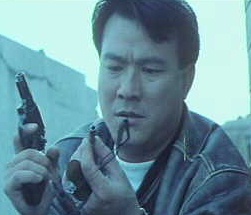
congee - A thin rice porridge, sometimes flavored with seafood.
coolie - A low-paid laborer; sometimes used as a derogatory term.
counting game - A popular Hong Kong drinking game; as with most drinking games, the rules are kind of sketchy, but it seems similar to the US game "bullshit."
CYF - Acronym for Chow Yun-Fat, one of Asia's most popular actors.
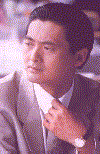
dai lo - Loosely translated, big (as in powerful or high-up) man. Sometimes used to sarcastically describe someone.
dim sum - A method of eating where many small dishes of food are brought out.
Dowager Empress - One of emperor Hsing Feng's concubines, Tzi Hsi, who was noted for controlling the succeeding emperors from behind the scenes and wasting time and money on lavish expenses and projects. She attained her power during the tulmutious times of the late 1800's, and has been portrayed or mentioned in some way in many historical kung fu movies, like Once Upon a Time in China. For more information, please go to this site.
Dragon Boat Festival - A 2,000 year-old festival that is held on the fifth day of the fifth lunar month. It is one of Hong Kong's most popular events. The Festival commemorates the death of a popular Chinese national hero Qu Yuan, who drowned himself in the Mi Lo River during the third century B.C., in protest against a corrupt government. Probably the most recognizable use of the festival in a movie is the assassination sequence from The Killer.
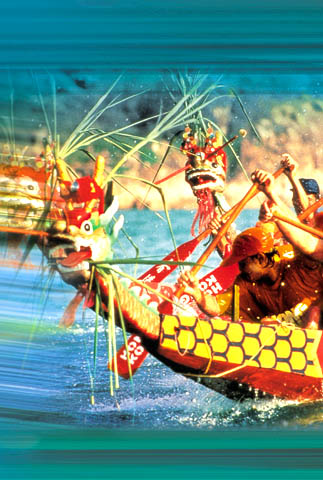
dubtitiling - A process in which a subtitled version of a movie follows the dubbing "script", which often leads to inaccurate translations. This has been occurring more with the growing number of major DVD releases of HK movies by US companies (Gen-X Cops, Gorgeous).
empty hands - Combat without weapons.
EU - Acronym for Emergency Unit; the arm of the police that assists other cops in taking statements and other routine duties. Similar to what people in the US might term "beat cops." Dramatized in the Benny Chan movie Big Bullet.
Page 1 / Page 2 / Page 3 / Page 4 / Page 5 / Page 6 / Main Page